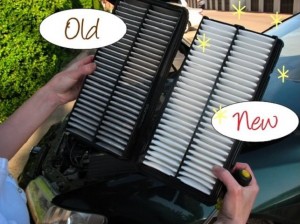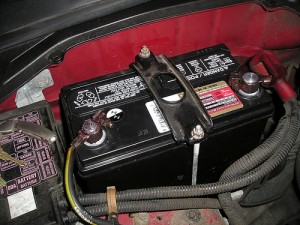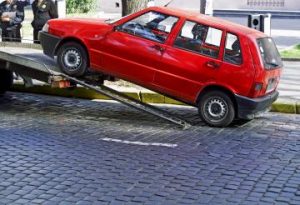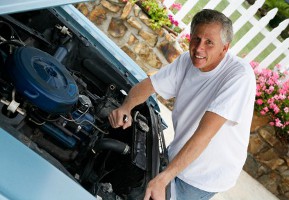 Today we want to talk about your engine air filter. That’s the filter that cleans the air before it’s burned in your engine. Many people wonder how often they should change their engine air filter. The simple answer is ” when it’s dirty”. That’s a function of how much air has passed through the filter, so your vehicle manufacturer will recommend a mileage interval for replacing the air filter. But it’s not hard to imagine that how dirty the air is will greatly affect how quickly the filter gets filled.
Today we want to talk about your engine air filter. That’s the filter that cleans the air before it’s burned in your engine. Many people wonder how often they should change their engine air filter. The simple answer is ” when it’s dirty”. That’s a function of how much air has passed through the filter, so your vehicle manufacturer will recommend a mileage interval for replacing the air filter. But it’s not hard to imagine that how dirty the air is will greatly affect how quickly the filter gets filled.
If you drive in a city or town where there’s lots of dust, pollution, or pollen, your engine air filter will get dirty more quickly and will need to be changed sooner. That’s why we check the air filter with every full-service oil change at Express Car Care. We can visually tell if the filter needs to be changed.
Your filter can only hold so much dirt. Once the filter is full, dirt will pass through to the engine. This dirt gums up the combustion chamber, hurts fuel economy and may cause damage. It can also contaminate the Mass Air Flow Sensor, which will affect drivability and can be fairly expensive to replace.
A dirty engine air filter would also restrict the amount of air that gets to the engine, which diminishes fuel economy. We can replace your air filter with one that matches the factory specifications or you can choose to upgrade your filter for enhanced performance.
So the next time your service adviser at Express Car Care shows you your dirty air filter, remember how important it is to have it replaced.

 Your suspension system keeps your car up off the road. From there, it’s responsible for a smooth and comfortable ride wherever you choose to drive. It also keeps your wheels firmly planted over bumps and through curves.
Your suspension system keeps your car up off the road. From there, it’s responsible for a smooth and comfortable ride wherever you choose to drive. It also keeps your wheels firmly planted over bumps and through curves. Car batteries wear out just like any other battery and need to be replaced. There are a couple of things vehicle owners should know when looking for a battery replacement: one is cold cranking amps and the other is reserve capacity.
Car batteries wear out just like any other battery and need to be replaced. There are a couple of things vehicle owners should know when looking for a battery replacement: one is cold cranking amps and the other is reserve capacity. Thanks for visiting the Express Car Care auto care blog. Today’s post lists 5 important reasons Denver drivers should follow recommended maintenance schedules.
Thanks for visiting the Express Car Care auto care blog. Today’s post lists 5 important reasons Denver drivers should follow recommended maintenance schedules. You may be surprised to learn that 40 percent of traffic fatalities in Colorado take place at night even though there’s 60 percent less traffic. It goes to show you how important proper visibility is to nighttime driving in our community.
You may be surprised to learn that 40 percent of traffic fatalities in Colorado take place at night even though there’s 60 percent less traffic. It goes to show you how important proper visibility is to nighttime driving in our community. All engines have either a timing belt or a timing chain to synchronize the opening and closing of the intake and exhaust valves. This keeps the engine running smoothly and efficiently. If the timing is off, it may not even run at all. Timing belts need to be replaced on schedule. A broken or slipping timing belt could cause extensive engine damage.
All engines have either a timing belt or a timing chain to synchronize the opening and closing of the intake and exhaust valves. This keeps the engine running smoothly and efficiently. If the timing is off, it may not even run at all. Timing belts need to be replaced on schedule. A broken or slipping timing belt could cause extensive engine damage. Denver drivers who are old enough have probably heard the term “fan belt”. Back in the day, the radiator fan in your vehicle was turned by a belt driven by the engine. There are still belt driven fans, although most are now driven by the serpentine belt. But most vehicles now have electric fans that draw fresh air across the radiator to cool it.
Denver drivers who are old enough have probably heard the term “fan belt”. Back in the day, the radiator fan in your vehicle was turned by a belt driven by the engine. There are still belt driven fans, although most are now driven by the serpentine belt. But most vehicles now have electric fans that draw fresh air across the radiator to cool it. Question: How do I know when I should get my tires rotated and balanced?
Question: How do I know when I should get my tires rotated and balanced? Question: Why isn’t my air conditioner blowing cold air?
Question: Why isn’t my air conditioner blowing cold air? In today’s Express Car Care auto care blog, we are focusing on battery maintenance. Eventually your car battery will fail and you will need to replace it. In fact, 70% of batteries don’t even make it four years. There are some things drivers can do, however, to make their battery last a little bit longer.
In today’s Express Car Care auto care blog, we are focusing on battery maintenance. Eventually your car battery will fail and you will need to replace it. In fact, 70% of batteries don’t even make it four years. There are some things drivers can do, however, to make their battery last a little bit longer.